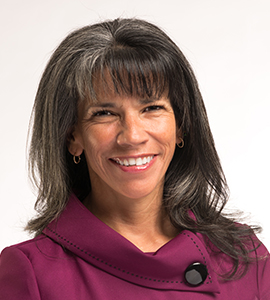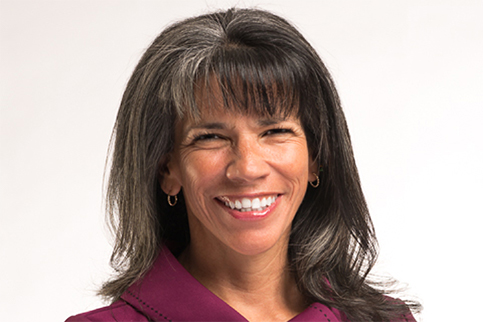Q: How did you get started as a leader?
Cyndy Flores, PA-C: Right after I graduated from PA school, I went to CAPA's educational conference. I was hanging out on the pool deck, and someone said, "Hey, you should come to the board meeting. It's a lot of fun."
Well, I like to joke that that was the last time I ever saw the pool. I went to the meeting, connected with some great people, and things just snowballed from there.
I spent the next 17 years working pretty intensively with CAPA. I served an extended term as president, sat on the board for about seven years, and was on more committees than I could count. We tightened the infrastructure and built CAPA into the second-largest physician assistant advocacy organization in the country. I also had the chance to participate in advocacy and policy work and to educate our industry about the role of PAs.
“Certain temperaments lend themselves to leadership. But the fundamental building blocks are inside everyone.”
Cyndy Flores, PA-C
Vituity Senior Director of Advanced Providers
Q: I understand your leaders took notice?
CF: The knowledge I gained through my professional activities opened doors for me at work.
In 2000, I was an emergency medicine PA at Vituity, and our advanced provider numbers were growing rapidly. Former Chief Operating Officer Mark Spiro, MD, began calling me with regulatory questions about the advanced provider side of the practice. After the third question, I joked that I was going to start charging him by the answer. We laughed, and to make a long story short, that's how I ended up heading our first advanced provider advisory committee.
Today, Vituity employs over 1,400 advanced providers throughout the US and we have increased our leadership opportunities within this pool. We've created leadership opportunities at the site and regional levels as well as directors of leadership, operations, recruiting and retention. We have over 120 site leads, seven regional leads, and many advanced providers serving on central committees. We've been able to build a very robust program, and I feel lucky to have been a part of that.
Q: What do you think prepared you to become a leader?
CF: I don't think I'm typical in this respect, but a lot of my leadership training has happened on the job. Many of the opportunities I've had didn't flow from any sort of expertise or strategy on my part. It was more of a willingness to jump in with both feet and splash around until I figured out how to swim.
Case in point: before I was a PA, I was actually a race organizer specializing in cause-related running and walking events. I didn't know much about races when I started out, but I saw a need and felt passionate about it. That gave me a lot of motivation to work hard and fight past obstacles.
Q: What makes a good leader?
CF: I think some of the most crucial skills in leadership can't be taught. To lead, you have to look around you and see what needs to get done. You need to recruit followers to your cause. You have to be open to others' ideas and perspectives. You have to be humble and admit your mistakes. Certain temperaments lend themselves to leadership. But the fundamental building blocks are inside everyone.
I guess my message is one of encouragement. Don't put off leadership because you feel you need special training or an MBA or a certain experience. Sometimes the most important thing you can do is simply step up. Hey, all I did was show up to a board meeting, and look what happened.
“Today, Vituity employs over 1400 advanced providers throughout the US.”
Q: When you look back at your achievements so far, what are you most proud of?
CF: A few years ago, my role with Vituity was expanding. So, with a heavy heart, I stepped down from active leadership in CAPA after 17 years. It was an emotional time, but it was also amazing to reflect back on how far we'd come. We'd built a small regional group into this robust, powerful organization that did great work for providers and patients. If you can leave an organization better than you found it, that's my definition of success.
Q: How do you balance being a senior advanced provider leader in a physician-led practice?
CF: It's definitely a balancing act, and it all starts with respect. The physicians are the owners of the practice. Without them, our advanced provider practice wouldn't exist. At the same time, our physician assistants and nurse practitioners are an incredible brain trust. I'm always encouraging the leadership to tap into this resource and listen to what they have to say. For example, as an organization we are looking at ways to connect our providers and promote personal health and one of our regional lead advanced providers suggested a partnership with Peloton to do a virtual Healthcare Hero’s ride. Our COO and CMO immediately supported this idea and we are off and running (or riding!)
“When we start the conversation with a focus on our shared goals, it's easier for the other party to listen.”
Q: Was that a tough line to walk?
CF: Sometimes. But at the end of the day, physician assistants, nurse practitioners, cRNAs and physicians all want the same things very passionately. We want to provide great care for our patients. We want to wow our hospital partners. We want a positive workplace culture full of support and respect. When we start the conversation with a focus on our shared goals, it's easier for the other party to listen.
Q: How do you advocate for the advanced provider perspective in this setting?
CF: It's funny you ask, because I recently raised the idea of adding an advanced provider to the executive leadership team. It's my job to build a strong advanced provider practice here, so I'm not afraid to ask and to sell ideas I believe in.
There's a lot of power in having integrity. When you're perceived as honest and trustworthy, you can push harder. So, you have to be mindful of that in all your interactions and really show others that you have their best interests at heart.
All that being said, advocating for the physician assistants and nurse practitioners is probably easier in our organization than most, because we've got a very supportive culture. The physicians want the advanced providers to be heard and have been very proactive about bringing us into the conversation.
Q: You really seem to have a lot of courage. Where does that come from?
CF: Someone once told me I had "moxie." I wasn't sure what that was, so I googled it. The original Moxie was a soft drink back in the 1930s. So, someone with moxie has energy, pep, courage, and determination.
I think real moxie comes from a deep belief that what you're doing is right and worthwhile. I can't say this about many things in life, but I pretty much loved every committee meeting I attended with CAPA. And I'm really excited about the direction Vituity is headed. Our EM Advanced Provider Fellowship Program puts fellows on the forefront of learning and delivering the most recent innovations in emergency medicine. That kind of conviction gives you the strength to fight for things. It gets you through a lot of challenges.
Originally published June 13, 2016.







 A notable exception is Cyndy Flores, PA-C, who currently serves as Vituity's Senior Director of Advanced Providers. She's a past president of the
A notable exception is Cyndy Flores, PA-C, who currently serves as Vituity's Senior Director of Advanced Providers. She's a past president of the 














